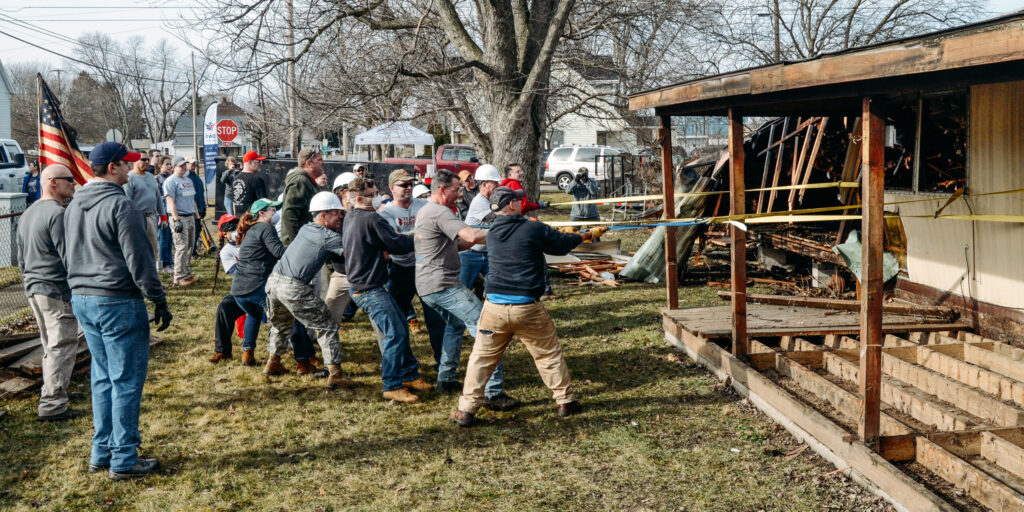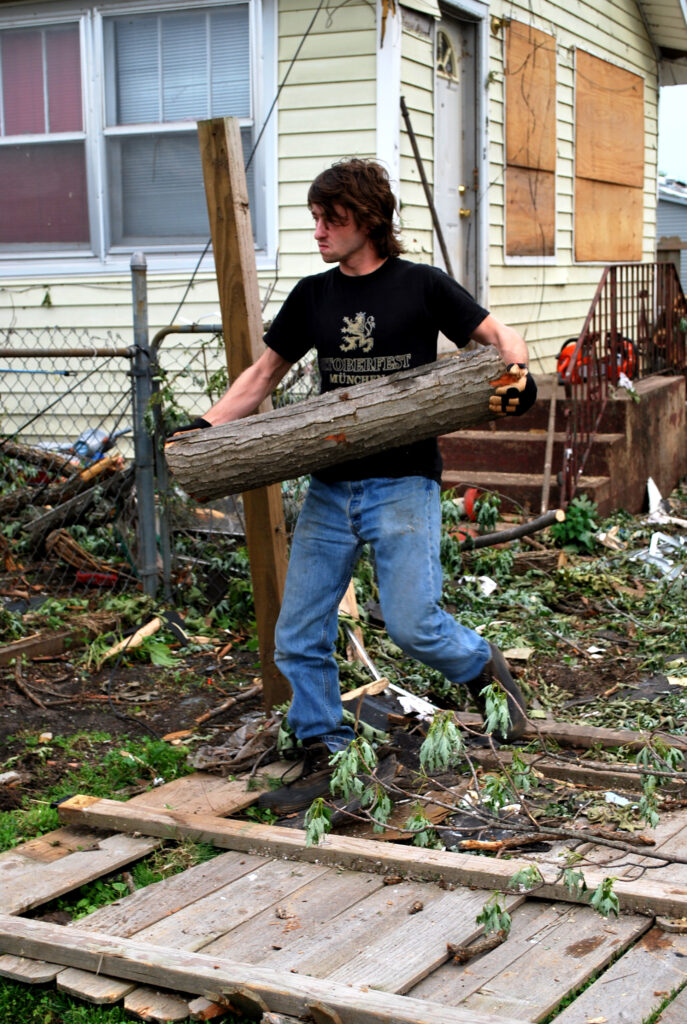In a California desert, sweating through my Team Rubicon grey shirt as I hauled a sled of dense mud through a neighborhood recently deluged by a flash flood, an elderly man I’d never met before offered me a shiny tinfoil package. He wasn’t a volunteer with Team Rubicon or any other organization so far as I could tell. He smiled and said he hoped I liked it. Then, he turned and walked down the street doling his alms out to victims of the flooding and other volunteers alike. As I watched him go, I unwrapped the offering, then quickly devoured one of the best burritos of my entire life.
It wasn’t the first time I’d been the recipient of such an act of catastrophe compassion while serving in a disaster zone and it wouldn’t be the last. In fact, one of the most emotionally rewarding aspects of volunteering for disaster response for me is witnessing the random kindness that erupts all around me. And it doesn’t just come from my fellow volunteers: More often than not, it comes from the very people we’re serving.
As a Team Rubicon Greyshirt volunteer, I’ve served communities struck by hurricanes, tornadoes, floods, and wildfires. It’s usually dirty, sweaty, difficult work. Whether I was chainsawing storm-downed trees off a home, removing flood debris from inside and around a house, mucking out homes filled with 4 feet of mud, or sweating through crawl spaces in protective gear, in nearly every single case I have been accompanied or assisted by the people who lived in the very community I was serving.
I mentioned the elderly man distributing home-made burritos: There was also the young mother whose community had been ransacked by wildfire, handing out pizza and cold water. The group of young servicemen—with the healthy lower backs that many of us more mature volunteers may lack—who jumped in, without asking, to help me haul major appliances to a curb. The tattoo parlor that offered free services to the volunteers in town helping with flood recovery. The barista who adamantly refused to let me pay for breakfast.
From Florida after hurricanes and floods, all the way to California after mudslides and wildfires, and to several places in between, I’ve been the regular and grateful recipient of gifts from people who just wanted to help me help people.
I’m confident that most, if not every, Greyshirt volunteer can attest to this in their own experience—and not only because my fellow Greyshirts have written about it time and time again in their reflections.
Debunking Disaster Crime Myths
My confidence is not starry-eyed optimism. I am not telling you that I believe people are inclined to demonstrate compassion and cooperation after disasters. I am telling you that I’ve seen it.
Jake Wood, Team Rubicon cofounder, once said, “If we treated each other every day like we do after disasters, we’d live in a truly special place.” That’s because, contrary to what many people expect and the media prefers to display, disasters tend to bring out the best in people. But I don’t think disasters bring out the best in people because Jake Wood said so: I think disasters bring out the best in people because that’s what the research says.

Take, for example, the issue of crime. Barring some exceptions, crime does not rise after a disaster—in fact, quite the opposite usually happens. After a disaster, most kinds of crime go down. A study published in the International Journal of Mass Emergencies and Disasters in 2009 analyzed the intersection of natural disasters and crime rates in Florida. The study authors sought scientific insights “on the degree to which disasters affect criminal behavior,” choosing Florida because the state is subjected to natural disasters nearly every year. They investigated 14 years of data from every county in Florida and concluded that “Although the media tends to portray images of ‘chaos’ and subsequently perpetuate the notion that disasters lead to a breakdown of the social order, our study shows that disasters diminish most forms of criminal activity.”
In nearly every category of property and violent crimes, from murder to burglary to vehicle theft, the study found that “natural disasters significantly decrease levels of reported index, property, and violent crimes.” Perhaps that’s because, the researchers postulated, disasters enhance feelings of community as survivors rely on each other for immediate needs and survival. “Prosocial behavior” is thus encouraged and individual acts of altruism flourish.
A decade later the journal Natural Hazards concurred with these results and published a comprehensive study of 10 years of county-level charitable donations, crime rates, and natural hazard occurrence in the United States. Natural disasters “affect crime negatively, dispelling popular notions regarding looting,” they concluded. What’s more, while donations inside a disaster zone decrease immediately following a disaster, donations from communities outside the disaster zone increase. In addition, even when the levels of outside assistance rise—whether governmental or charitable—how residents in the disaster zone treat each other doesn’t change. In other words, people continue to help each other after disasters, regardless of how many donations or outside support they get.
Altruistic Solidarity a Hallmark of Catastrophe Compassion
Stanford psychologist Jamil Zaki published a study in the journal Trends in Cognitive Sciences outlining what he described as “catastrophe compassion,” the propensity for people suffering through calamity, or those witness to it, to react with altruistic solidarity. Catastrophe compassion is just the idea that tragedy encourages people to help. Writing in the wake of COVID-19 in 2020, Zaki explained how “Catastrophe compassion is widespread and consistent; it follows earthquakes, war, terrorist attacks, hurricanes, and tsunamis, and—now—a pandemic.”

Zaki connects disasters to several social behaviors, including criminal action, and finds that the historical record is clear: “Far from rendering people antisocial and savage, disasters produce groundswells of prosocial behavior and feelings of community.”
As one hurricane survivor explained in their response to a 2023 study about post-disaster crime and media coverage conducted by the University of Colorado’s Natural Hazards Center, “Even some of my anti-social neighbors became friendlier. It was neighbors helping neighbors.”
Mutual aid and volunteer organizations are frequently launched in response to disaster (Team Rubicon is one such, having formed after the 2010 Haiti earthquake), and survivors routinely report witnessing repeated and widespread acts of individual and group charity and often experiencing greater feelings of community after disaster. There are even occasions in which “survivors look back on disasters with a surprising amount of nostalgia…in their aftermath individuals glimpse levels of community, interdependence, and altruism that are difficult to find during normal times.”
The Best of Humanity on Display, With No Reservations
Beyond the community suffering through the effects of a disaster, Zaki demonstrates that people from communities unaffected by the disaster will go out of their way to help the people who were. Disaster-struck communities regularly see floods of donations and volunteers from outside the impacted area. Greyshirts are an excellent example of this. Team Rubicon volunteers from all over the country descended upon communities in five of the states affected by Hurricanes Helene and Milton. They arrived right when the storms hit and, though the media moved on, the Greyshirts remained. To date, more than 1,500 Greyshirts have assisted more than 37,500 individuals affected by Helene and Milton. They are among hundreds, if not thousands, of other volunteers from dozens of organizations continuing to provide hurricane relief for weeks and months to come.
Looting after a disaster does happen. The way post-disaster looting is framed in the press, however, is often unnecessarily alarmist and generally inaccurate. The horror stories from Hurricane Katrina—summed up with 100% inaccuracy by this NPR headline at the time: “Looting, Snipers Mar New Orleans Evacuation”—were overblown, out-of-context, or just completely wrong. There were no snipers, there was no mass looting, and basically every grisly report out of the Superdome was wrong, as detailed by the New Orleans Times-Picayune 10 years later.
Humans, it turns out, are pretty cool. We go a long way
to help people in need.
That’s similar to what we have experienced in the Appalachians since Hurricane Helene. The press amplified unverified stories of looting, anti-government militias, and federal agency malfeasance, while the truth is far simpler and more normal. The response to Helene, the mayor of Knox County, TN, told Reason Magazine, “once again showed how local communities come together to help their neighbors even before government is mobilized. I saw a lot of that.”
Humans, it turns out, are pretty cool. We go a long way to help people in need. I serve in some of the worst of times—after floods wash away towns and tornadoes twist entire communities like tiddlywinks. And yet, I get to see the best kinds of catastrophe compassion on a regular basis.
It’s just one of the benefits of being a disaster relief volunteer: in the worst of times, you see the best of America, the best of humanity, all on display with no reservations or thoughts of reward, just people helping people. It’s beautiful to watch, humbling to receive, and impressively common.



